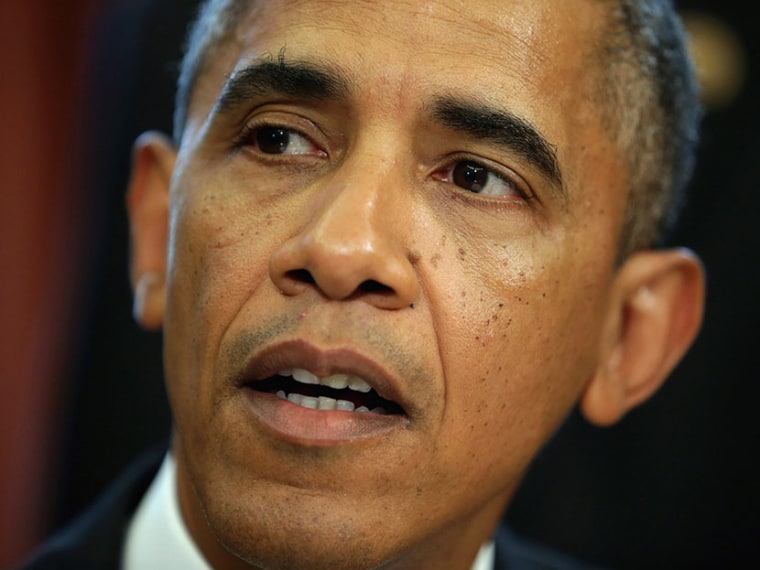Under pressure from Congress and a wary public over domestic surveillance, President Obama Friday announced four major initiatives to address concerns, strengthen transparency, and improve oversight for some aspects of intelligence gathered by the National Security Agency.
The president said he sought to strike the right balance between security and privacy. "It's not enough for me as president to have confidence in these programs," he said. "The American people need to have confidence in them as well."
Obama said his first priority would be to work with Congress to reform Section 215 of the U.S. Patriot Act, which has been used for the collection of phone records of American citizens. He also said he wanted to improve confidence in the oversight capabilities of the secret court which authorizes that collection. Until now, the court's rulings—such as blanket orders to companies including Verizon to hand over phone records—have not been subject to challenge. When evidence of that order emerged in June, in documents obtained by The Guardian and The Washington Post, both the public and the companies pushed for change. Obama said that such orders would now be open to adversarial challenge.
"There are steps we can take to give the American people additional safeguards against abuse," Obama said. He did not say that any surveillance methods or storage of collected American data would be stopped or changed. Instead, Obama sought repeatedly to assure the public that the NSA programs were legal and safeguarded from abuse.
The White House handed out two separate fact sheets during the news conference. One from the Justice Department laid out a legal rational for why the government believes it is using Section 215 appropriately. The second document, put together by the NSA, describes the spy agency's mission and the controls it says are in place to prevent the misuse of information it collects.
In a nearly hour-long news conference before leaving for vacation, the president also discussed his relationship with Russian President Vladimir Putin, recent threats posed to U.S embassies abroad by al Qaeda, healthcare, immigration reform, and the possibility of a government shutdown.
Acknowledging that secrecy has harmed government credibility, Obama said he would seek further transparency from the NSA, the largest intelligence agency and the one tasked with collecting phone records, email, and other electronic data. He said the NSA, based at Fort Meade, Md., would set up a full-time privacy and civil liberties office. He said he'd also urge the Senate Intelligence committee to establish a website to serve as a hub for transparency issues.
Finally, Obama announced the creation of a high-level group of outside experts to review the extraordinary surveillance capabilities now in the hands of the intelligence community, and to provide "new thinking for a new era." He did not name anyone to the panel, but said it would be tasked with producing an interim report within 60 days and a final report by the end of the year.
The president said he had also been concerned about the government's vast capabilities. He said his administration was already considering reforms when Edward Snowden, a former CIA officer and NSA contractor, came forward with documents revealing the nature of domestic surveillance that captured electronic communications of tens of millions of Americans.
"There’s no doubt that Mr. Snowden’s leaks triggered a much more rapid and passionate response than would have been the case if I had simply appointed this review board to go through, and I had sat down with Congress," Obama said. "It would have been less exciting, it would not have generated as much press."
Snowden was granted temporary asylum in Russia after providing reporters with documents a little more than eight weeks ago. Obama has said he should be returned to the United States. He has cancelled a planned September summit with Putin.
"I don't think Mr. Snowden is a patriot," Obama said.
On healthcare, Obama chided congressional Republicans for having a "ideological fixation" on repealing the Affordable Care Act. Some Republicans have threatened a government shutdown this fall unless the law is de-funded. Obama said the GOP's number one priority "is making sure 30 million people don't have healthcare." He said he was "confident that common sense in the end will prevail."
Asked about the threat still posed by al Qaeda, Obama reiterated that the organization's core is gone, but capabilities remain. He said the United States continued "to go after known terrorists," including those who carried out an attack last year on a U.S. diplomatic post in Libya, killing four Americans.
Later in the news conference, Obama urged the House to take up immigration. He said the U.S. economy would be "a trillion dollars stronger if we get immigration reform done." Obama said he was confident it would pass. "Let's get it done."
